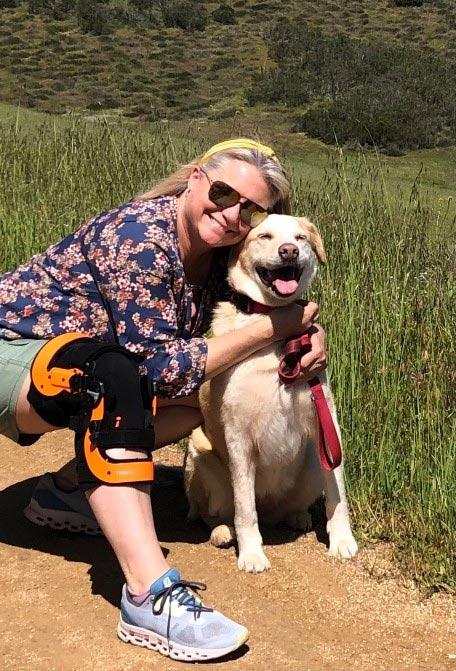
Living with fibromyalgia - Jenny's story
Peer reviewed by Dr Colin Tidy, MRCGPLast updated by Lawrence HigginsLast updated 14 Aug 2025
Meets Patient’s editorial guidelines
- DownloadDownload
- Share
- Language
- Discussion
Jenny Dunton has spent almost 30 years living with fibromyalgia, a condition which causes her daily pain. But over three decades, Jenny has discovered ways to cope and calm her symptoms - and she wants to spread the message that you can have fibromyalgia and thrive.
Find out how Jenny manages her fibromyalgia and tips that could help you too.
In this article:
Over the phone, Jenny's sunny Californian accent fills with warmth as she describes her family and her canine sidekick, Petra. For Jenny, nature walks with Petra have at times been her lifeblood, whenever she feels constrained, misunderstood, or like she isn't enough.
"Fibromyalgia takes a very real physical, mental and social toll, even if our lives are filled with love. But if you are diagnosed and afraid you won't be able to live a full life, I'm telling you that you absolutely can." - Jenny Dunton, mum of two, on her living with fibromyalgia for 27 years.
Continue reading below
Living with fibromyalgia
Fibromyalgia is a long lasting (chronic) pain and sensory disorder.
Symptoms can include severe pain, as well as exhaustion, sleep problems, memory and concentration difficulties, and sensitivity to other sensory stimulants like bright lights.
There's no cure, but research is advancing our understanding of its causes and treatment.
For example, it's thought that it may be triggered by stressful or traumatic events, muscle injuries, illnesses and other causes such as obesity.
Treatments currently include medicine, exercise programmes, talk therapies, and stress management techniques such as meditation.
Up to 5% of people in the world have it1 - an estimated 2.9 million in the UK2 and 4 million in the US3.
Between 80 and 96% of these cases are women1.
This puts fibromyalgia among other female-dominated disorders - like endometriosis, and chronic fatigue syndrome - in need of more research and understanding4. But Jenny has witnessed the progress that's being made. Here, she shares her story.
Jenny's story
Jenny has been living with fibromyalgia for 27 years.
Her book, Fibromyalgia: A Journey of Self Discovery, 27 Years Traversing the Unknown is Jenny's personal story - her challenges, learnings, and triumphs as she navigates life with this mysterious pain disease. But most of all, it's a book about hope: "I want to let people with a diagnosis know that Yes! You can have children, and Yes! You can have a career, if these are things you desire. There's no reason why you can't have a fulfilling life."
A person who has always favoured the tranquillity of the coast over the bustle of city living, Jenny has spent most of her adult life around Monterey Bay, California. Here she currently lives in the charming town of Seaside, and has two grown-up sons, Cooper and Luke - who she credits with giving her the confidence to write the memoir.
She also has partner, Marc, and her canine sidekick in life, Petra.
Jenny and her dog Petra

As we start talking, it soon becomes clear that Jenny's on a mission to make whoever reads her story feel like they are enough, and that they can overcome life's challenges and thrive.
Continue reading below
Getting diagnosed with no cause or cure
Jenny's story begins in 1996, as an adventurous and energetic 24-year-old college graduate. Looking back, Jenny recalls that a sensation of pain had been building for weeks, but being someone who loved outdoor activities, she'd assumed it would pass.
"I remember, wow, that took my breath away," she remarks on the moment that a searing pain one bike ride pushed her to see a doctor. It was here Jenny was first told that she had a chronic disease called fibromyalgia - and that there was no known cause, and no cure.
As I repeat this line from Jenny's memoir back to her, I hear her take a breath, and her next words are charged with emotion: "Even when I think about that now, 27 years on, it still takes my breath away and I get nausea in my stomach. It takes me back to being 24 years old and feeling like my life was over. I just thought I was dying - that's where my head went at that young age."
"But over time, I've learned that fibromyalgia is really an umbrella term - a placeholder name for a group of symptoms some people have that scientists are still trying to fully understand.
"This is important, because this means there is hope."
Navigating a mysterious disease
In the 1990s, there was little written and understood about fibromyalgia, and diagnosis is based on tests that rule out other possible causes of your pain. From the moment Jenny was diagnosed, she was told she'd probably encounter scepticism and doubt.
"It's such a strange experience, sitting in a doctor's office, on the one hand being told by them that you have this disease, on the other hearing that there will be doctors who don't believe it."
She pauses, and then explains that keeping her train of thought is one of the challenges of this condition. "I guess I appreciated having that warning, but it also sent me into more panic," she goes on.
"It's a lot better nowadays, but at the time there was no evidence that anything was wrong with me. I'll always remember a college friend of mine, an ER nurse, pulling me aside on a hike - this was my early 30s, and by then I had to do a lot of preparation for activities like this, including stretches.
She said: "You know Jenny, a lot of people don't believe in fibromyalgia - you might not want to tell people in ER wards that you have it." So, I started to not share it with people, except for my doctors."
Because, at that time, fibromyalgia wasn't well understood medically, there were no specific treatments to help manage the pain. Jenny recalls being passed between specialists, including rheumatologists, but with no specific checklist for treating fibromyalgia pain, no one was able to help. However, she's also witnessed positive changes.
Continue reading below
Witnessing positive progress
"I've noticed a drastic change in the last 10 years," says Jenny, her voice filling with hope and positivity. "We're not completely there yet, but now I almost always get the respect of being believed, even though fibromyalgia still isn't fully understood.
"But we're getting there with understanding it too. New research has shed much better light on what's going on inside our bodies."
Experts now believe that people with fibromyalgia may have chemical imbalances in the brain, and that their central nervous system goes into overdrive, which in turn amplifies pain around the body5.
Since 2016, this type of pain has been termed nociplastic - meaning that pain happens, despite there being no nerve or tissue damage, because pain messages in the central nervous system become distorted.
For Jenny, watching videos by Dr Daniel Clauw, director of the Chronic Pain and Fatigue Research Centre, has been especially helpful and empowering.
"To learn about brain imaging and to understand, as experts do now, that fibromyalgia is to do with the brain-to-nervous system connection, has allowed me to look at the condition from a whole body perspective."
"For now, what this has done is given me a sense of control in my pain management journey. For example, research now suggests that fibromyalgia is sometimes triggered by past trauma - and to look at my condition from this perspective opens up new possibilities for treating the cause. Perhaps I can start to deal with my symptoms through therapy or meditation."
Prioritising calm and balance
As a result of this research, Jenny's now prioritising techniques that aim to calm the nervous system. She describes fibromyalgia as living with your fight-or-flight stress response always on - putting your body in a constant state of exhaustion.
Jenny says: "Creating a work-life balance is so important. We all live in a world where workplace stress and expectations have increased. With fibromyalgia, I had to learn to draw the line, to believe that I'm valuable enough to not push myself to the limits.
"Hopefully, the line you need to draw is respected. But if it's not, big changes need to happen - whether it's changing your career or, very sadly, ending a relationship."
Jenny's advice to others with fibromyalgia is to find a passion that brings them a sense of calm. "For me, it's being outside in nature. Ask yourself what works for you - is it journaling? Hiking? Baking? It's not always easy to make time for yourself - especially if you've got young children - but quiet time is important."
Facing life's challenges
Because fibromyalgia may disrupt people's lives significantly - and because it's still not well understood - depression, isolation, and stigmatisation can be common challenges1. And while everyone's experience is unique, careers and relationships may be affected.
Career
While Jenny's condition doesn't define her, it has forced her to redefine herself through different careers, because she's had to change what she was doing when it wasn't manageable.
This wasn't easy, as like many young people Jenny had thought she'd have one career - and had fallen in love with event planning ever since getting her foot in the door with Monterey beach events and parties.
But even though she'd found a passion, functioning on pure adrenaline and determination for days on end took its toll. Jenny went through many adjustments and companies - from multiple-day events to single-day, from working full-time to part-time, and eventually to setting up her own sustainable event business to accommodate the physical crashes she experienced after bouts of hard work.
She describes how her body became unable to do what she was forcing it to do anymore: "It felt as if someone had poured cement over my body."
At the age of 42, it could take her weeks to recover from an event. And what she calls "fibro fog" meant that she'd forget names and find it hard to retain information.
When she closed her business, it took Jenny time to get over the heartache of her self-perceived "career failure", and the financial stresses it's caused. But a stint as a 6-year-old boy's nanny, a job she'd never imagined for herself, helped change her perspective.
In her book, Jenny describes how the impact she made as a nanny became more important than anything she ever did as an event planner: "We need to look a little differently at how we assess value upon ourselves. Job titles and paychecks have distorted how we value personal success."
Personal connections
Jenny had also assumed she would find and stay with one partner. "But with a chronic illness, sometimes that fairytale dream doesn't work out with that person."
She's experienced two major heartbreaks in her adult life - her marriage with college sweetheart and Cooper and Luke's father, Shaw, and a second long-term relationship with partner Eric.
Both relationships ended in part due to Jenny's fibromyalgia, and the changing demands in brought on her. Career envy, withdrawal, and evolving physical challenges - like the pain of a hug or of snuggling on the sofa together - all played a part.
Having an invisible illness is a unique challenge when it comes to your relationships. Dealing with pain, feeling constantly exhausted, and finding it hard to keep your train of thought aren't symptoms others can see, and some friends and partners may not always understand.
"I don't blame people," says Jenny, "it's got to be incredibly confusing seeing someone up and about one day, and unable to leave bed the next."
But for Jenny, it's hugely important when loved ones try to understand fibromyalgia: "Understanding what someone is going through is the key to unlocking the door to empathy - and empathy helps people with fibromyalgia so much. It's frustrating not getting the respect and understanding you deserve. This is why communication is so important with your friends and family members."
Having hope for the future
"I'm glad you've asked me that!" Jenny exclaims when I ask about her outlook for the future. "There's no reason you can't have a full life, full career, be a mum or dad - but what you can't do is brush it under the rug. I did this for years, trying to hide my pain and 'grin and bear it' in my thirties and forties. Now, I don't think this is smart," says Jenny.
"For me, the key was learning to be realistic - having one day on and one day off. This means picking and choosing the events or activities I want to be fully invested in, and then planning ahead so I can take that next day off to rest and recuperate."
As people with fibromyalgia often hold their pain inward, Jenny thinks that having both a primary care doctor and mental health professional is also important.
"Ultimately, I have so much hope in the future - with ongoing research into brain imaging, our understanding of fibromyalgia is continuing to improve. I'm not a professional, but this makes me really believe that in 10 years there will be much better ways to manage our pain. I feel we're so close.
"My book documents my journey with fibromyalgia through my twenties, thirties, forties, and fifties, but really I've written this memoir for the 24-year-old who felt they wouldn't be able to live a full life. I'm telling you - if you've been diagnosed - that you absolutely can."
Further reading
Patient picks for Muscles

Bones, joints and muscles
How to build muscle mass after weight loss treatment
Losing a significant amount of weight - especially if it happens too quickly - can have a negative impact on your muscle health. Your body may break down muscle tissue to use as energy, leaving you weaker and less resilient. That’s why it’s important to focus on rebuilding and strengthening your muscles, so you can restore what was lost and support your long-term health.
by Victoria Raw

Bones, joints and muscles
What is sarcopenia?
It's inevitable that when we get older, our bodies start to change. One of the areas in which we might notice a difference is our muscle strength. This decline - known as sarcopenia - is a normal part of the ageing process. While we don't recommend stepping into the ring with Anthony Joshua anytime soon, understanding sarcopenia can help you take proactive steps to manage it as you get older.
by Victoria Raw
Continue reading below
Article history
The information on this page is peer reviewed by qualified clinicians.
Next review due: 14 Aug 2028
14 Aug 2025 | Latest version
23 Feb 2024 | Originally published
Authored by:
Amberley Davis

Ask, share, connect.
Browse discussions, ask questions, and share experiences across hundreds of health topics.

Feeling unwell?
Assess your symptoms online for free
Sign up to the Patient newsletter
Your weekly dose of clear, trustworthy health advice - written to help you feel informed, confident and in control.
By subscribing you accept our Privacy Policy. You can unsubscribe at any time. We never sell your data.